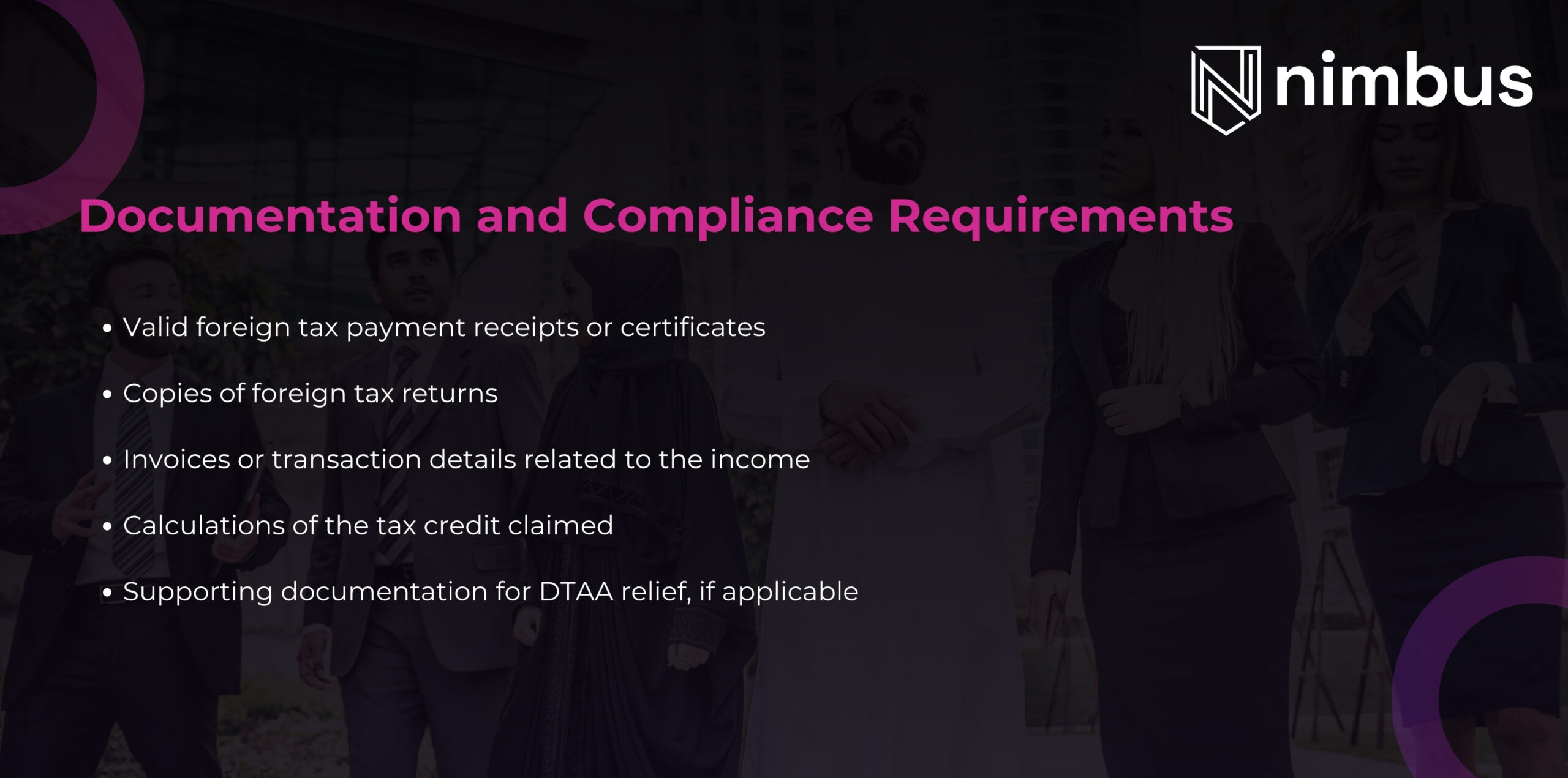The UAE’s introduction of corporate tax in 2023 brought a major shift for companies operating across borders and for investors eyeing business setup in the UAE.
Businesses that earn income both inside and outside the UAE now face the possibility of being taxed twice on the same income, once in the foreign country and again in the UAE.
To help mitigate this, the Foreign Tax Credit (FTC) allows companies to reduce their UAE corporate tax liability by the amount of tax they’ve already paid in another country, within certain limits.
But to use this effectively, businesses must understand how the credit works, what qualifies, and how to plan around its limitations. This post explains how UAE businesses can use the FTC strategically to avoid double taxation and ensure compliance under the new tax regime.
Using the Foreign Tax Credit to Avoid Double Taxation – Overview for Investors

1. Understanding the Foreign Tax Credit (FTC) in the UAE
The FTC is a provision under Federal Decree-Law No. 47 of 2022, the UAE’s corporate tax law. It allows businesses that are tax resident in the UAE to offset foreign income taxes against their UAE corporate tax due on the same income.
This aligns the UAE with international tax norms, especially the OECD’s principles on double taxation relief. UAE businesses with international income, from branches, subsidiaries, or licensing arrangements, can potentially reduce their local tax bill using this mechanism.
2. How the FTC Offsets Foreign Taxes Against UAE Corporate Tax?
The FTC can only be claimed if the income is taxable in the UAE and has been taxed abroad as well. The maximum credit is equal to the UAE corporate tax due on that foreign-sourced income. Any foreign tax paid beyond that amount is not refundable or carried forward.
For example, if a company pays 20% tax in a foreign country but is only liable for 9% UAE corporate tax on that same income, it can only claim 9%. The additional 11% paid overseas is a sunk cost under current UAE rules.
Let’s say a UAE company earns AED 1,000,000 in Country A and pays AED 120,000 in corporate tax there.
- In the UAE, 9% tax would apply on AED 1,000,000 = AED 90,000
- The business has paid AED 120,000 abroad, which exceeds UAE tax
- UAE Corporate Tax liability on this income = Zero
- But the excess AED 30,000 cannot be refunded or carried forward
3. Eligible Foreign Taxes vs. Non-Qualifying Taxes
Not all foreign taxes count toward the FTC. To qualify:
- The tax must be an income tax or tax imposed in lieu of income tax.
- It must be legally owed and paid.
Excluded taxes include:
- Sales tax or VAT
- Payroll and social security taxes
- Customs duties
- Estimated or potential taxes not actually paid
Only documented, assessed foreign income taxes are eligible. Please note that to claim an FTC under the UAE CT regime, businesses must meet certain conditions including the following.
– Be a UAE tax resident
Foreign entities with only a PE in the UAE are generally not eligible.
– Income must be subject to tax in a foreign jurisdiction
This could be withholding tax, income tax, or corporate tax imposed by a foreign country.
– Same income must also be taxable in the UAE
You cannot claim an FTC on income that is exempt or excluded from CT in the UAE (e.g., qualifying intra-group dividends).
– Proof of foreign tax paid
The business must maintain proper documentation such as tax payment certificates, tax returns, and assessment orders.
4. Documentation and Compliance Requirements
Claiming an FTC under the UAE Corporate Tax Law isn’t automatic. Businesses need to maintain:

- Valid foreign tax payment receipts or certificates
- Copies of foreign tax returns
- Invoices or transaction details related to the income
- Calculations of the tax credit claimed
- Supporting documentation for DTAA relief, if applicable
During audits or reviews, the UAE Federal Tax Authority (FTA) may request this information to validate the FTC claim. These records will support your claim during audits and ensure compliance with UAE regulations.
5. How Double Taxation Agreements (DTAs) Enhance FTC Benefits?
The UAE has DTAs with over 130 countries, which often provide relief mechanisms such as reduced withholding tax rates or tax exemptions. These agreements may:
- Lower the effective foreign tax burden
- Specify which country has taxing rights
- Allow for full or partial FTCs
When both UAE domestic law and a DTA provide relief, businesses must choose the most beneficial option, but cannot claim credit twice on the same income.
6. Key Limitations You Should of the FTC
The FTC is capped at the UAE tax payable on the same income and excess credits cannot be carried forward or refunded. FTCs cannot be claimed on:
- Non-taxable or exempt income
- Income removed from the tax base through adjustments
- Non-income foreign taxes
For companies operating in high-tax or non-DTA countries, this means unrecoverable tax leakage can be significant.
7. Strategic Implications for Businesses
Using the FTC provision effectively requires strategic planning. Here are a few tips.
– Map Your Global Income Sources: Understand where income is taxed and how much.
– Structure Transactions for Efficiency: Consider sourcing, supply chains, and payment routes to benefit from lower withholding tax jurisdictions.
– Use Treaty Networks: Maximize benefits under UAE’s DTAs when expanding globally.
– Monitor Foreign Tax Changes: Track legislative changes in foreign jurisdictions that may impact your tax liability and credit eligibility.
Working with experienced tax advisors can help reduce unrecoverable foreign taxes and maximize overall efficiency.
Team Up with Experts
As UAE companies expand their global footprint, the Foreign Tax Credit is an essential tool for navigating international tax obligations and avoiding double taxation.
However, understanding its rules, limitations, and interactions with DTAs is crucial. By maintaining proper documentation, aligning tax strategies across jurisdictions, and seeking expert guidance, UAE businesses can stay compliant and save significantly under the evolving corporate tax landscape.
As more investors look for company formation in the UAE and become a UAE tax-resident, the FTC offers a powerful way for businesses to protect their bottom line while meeting cross-border compliance requirements.



